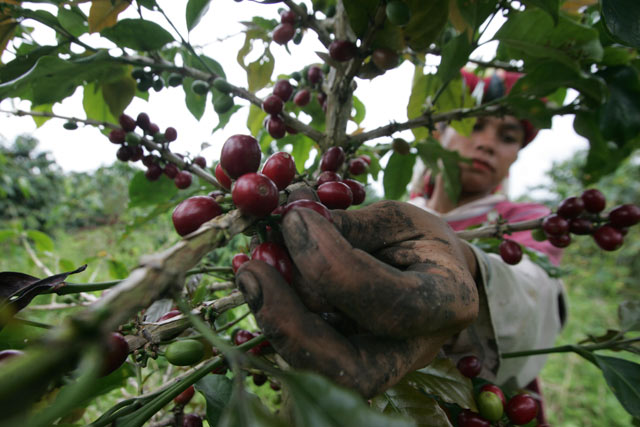Sumatran coffees - always an exciting challenge
Date Posted:1 March 2021

Sumatran coffees - always an exciting challenge
Sumatra has played a significant role in the long history of coffee and some of the most popular early blend combinations involved the pairing of Sumatran coffees with Yemeni heirloom lots and with Yemen coffees becoming rare and difficult to source, natural processed Ethiopians like Harrar and Sidamo are combined with Sumatrans to become the famous "Mocha" blend.
These days, it's a remarkably different story with how Sumatran coffees are used and it may in fact be rare for a Sumatra coffee to be used in a company's Mocha or Moka blend.
For the last six years, Sumatran coffees have been in short supply and most import brokers have been less inclined to procure Sumatran for fear of taints or being left stranded with expensive coffee they can't sell.
There are two primary reasons for the ongoing shortfalls - firstly, adverse weather conditions can "ruin" crop yields and "spoil" the traditional wet hulling techniques used to process Sumatran coffees. Indonesia has experienced many consecutive seasons of abnormally high rainfalls that some are putting down to effects of global warming.
Secondly, the more profound impact has come from the US market being the largest buyers of Sumatrans and a few of those large US brands (Starbucks and Green Mountain in particular) travel directly into Indonesia to "pre-purchase" vast quantities of current and future crops, in effect buying up forward volumes. Naturally, whenever there is a shortfall or increased demand, prices rise.
There's a reason many US companies love to use Sumatran coffees and the simple explanation is due to the ways in which a lot of the US coffee companies tend to roast their coffees to "almost death", or dark.
Sumatrans can indeed take plenty of heat, in fact they need and love lots of heat during the roasting process. At darker roast levels, the margins for error with Sumatrans are lower compared to many other origins that will fry up or char, hence why the US companies love them because it's almost a coffee that needs little talent in the roasting department.
Sumatran coffees are indeed quite intense, typically ranked up high in terms of strong flavours, acidity and complexity. They punch well above their weight and generally it's the roaster's seeking a "strong or bold" cup that prefer to play with Sumatrans as it's like a "turbo" boost.
After 6 consecutive years of shortfall in supply and with increased US demand, prices remained consistently higher compared to other origins, a reason they consistently commanded high premiums in the market, regardless of cup quality.
The other important point to note about Sumatrans is the high risks of cup taint due to the unique and distinctive process used by Sumatran coffee farmers called "wet hulling".
No other coffee origin uses this technique to it's exclusive to Sumatra. Some of the ways in which small family farms process the coffee is highly manual, beating the coffee pulp with sticks in tubs.
This process has far greater challenges in controlling the quality of the end product as often most Sumatran coffee farmers lack the basic levels of infrastructure to protect and manage the processing cycle, even just simple sheds or warehouses.
It's not unusual for Sumatran coffees to be dried on tarps outside without covering, so if a rain or shower storm passes quickly it most likely will cause problems with the final product.
The wet hulling process also retains a lot more moisture in the coffee beans, so careful drying and handling of the processed raw coffee is important - if it's not packed in the right condition, it will develop musty and mould taints and this has often been the risks in purchasing Sumatran lots.
With limited availability of better controlled storage options the coffees are left in humid conditions where the high moisture levels may cause the coffee to "sweat", particularly if packed with liners.
Paying high prices and discovering defects or taints will only end in tears and it's fair to say that most long established roasters will have had at least one or more disappointing and frustrating experiences with Sumatrans that are "off".
But it's not all bad news.
Sumatrans are both complex and interesting. They provide something that's exciting and not found in other coffee origins and they certainly have that X-Factor.
It's also not unusual for the cup to change from day to day and from bag to bag when you are roasting coffee from the same "lot".
Sumatran coffees require a long period from roasting to develop - up to 2 weeks, and in fact if you attempt to drink Sumatran coffees when they are just a few days old it's likely you will experience an unpleasant brew and incorrectly assume it's defective, or it tastes herbal.
Yes, that's right, they go bad before turning good and time is important to rest and develop.
Sumatrans generate amazing flavours and a bold cup.
More than a decade ago, most coffee roasters used Sumatrans to supercharge intensity, but with high costs, scarcity and significant risks of unknown defects (or quality and consistency) it has turned many roasters away from Sumatrans.
It's only been in the last month that super-high pricing of Sumatrans has eased down a little - but they are still expensive relative to other origins. Our understanding for the slight price drops has been due to lower demands from the large US roasters as a direct impact of COVID during 2020 - so with a bit more supply from softer US demand, prices have flattened a bit.
Australian coffee drinkers increasingly seek sweeter, cleaner and lighter experiences which is at odds with the bold, complex, funky intensity of Sumatrans.
With many roasters having dropped Sumatrans from their portfolio because of cost, sourcing difficulty, we expect there may be a resurgence in the short term.
Sumatrans have a tendency to overpower in blends, even when used for less than 30%, the Sumatran may hide the delicate features of other origins, so careful blend design is needed to ensure the result is balanced and complimentary.
Not everything in the coffee universe needs to subscribe to the same play book of sweet, clean and smooth and it's the reason we will continue to support and feature Sumatran coffees in our store so that enthusiasts can indulge and discover some of the rewarding secrets of this unique and distinctive origin.



